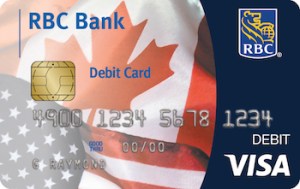Published August 25, 2017 • 6 Min Read
When you’re planning a vacation, weekend getaway or your annual winter escape to the United States, one of the biggest considerations is money. Despite our increasingly cashless society, many people still go to the bank to purchase large amounts of U.S. dollars before taking a trip south of the border.
While the loonie has gained ground against the greenback recently, it’s still far from par – and the exchange costs you money. Here are five good reasons not to carry a lot of cash on your next trip to the States.
1. It’s Not Secure
The simplest reason for not bringing large amounts of cash to the U.S. is that it can be lost or stolen — and once it’s gone, it’s gone. If your debit or credit card goes missing, you have protection from your financial institution. You can immediately cancel the card, and usually you are not held responsible for fraudulent purchases.
Tip: It’s best to have a copy of the front and back of your debit and credit cards. Be sure to pack these copies separate from your actual cards. That way you have the card numbers and other details at your fingertips in case they are lost. Also, save the emergency numbers for your bank and credit card providers on your cellphone for quick access.
2. You Could Be Missing out on Better Exchange Rates
Exchanging a large amount of money before your trip means your only option is the exchange rate on the day you exchange your funds. Exchanging smaller amounts of money over time or even a larger amount of money at one go when the rates are favourable, reduces your risk of being stuck with a less favourable rate near the time of your trip.
If you travel frequently to the U.S., consider opening a U.S.-based bank account, so you can easily use a U.S. debit card to pay for purchases avoiding foreign transaction fees or access cash at U.S. ATMs. Some Canadian banks offer U.S.-based accounts and even allow you to manage your U.S.-based account with online banking — so you can keep an eye on the exchange rate and transfer funds from your Canadian account to the U.S. account when rates are favourable.
3. You Won’t Have Protection for Your Purchases
A credit card can provide purchase security protection for your purchases as well as insurance coverage for travel accidents, trip cancellation or interruption, emergency purchases and rental cars; however, many people don’t realize they pay foreign transaction fees of approximately 2.5% when using their Canadian credit cards in the U.S. This fee is typically included in the overall purchase amount — you can find out how much it is if you calculate the current exchange rate minus the cost of your purchase.
If you travel frequently to the States, consider applying for a U.S.-based credit card to save on foreign transaction fees at the time of purchase. Having a U.S. credit card can help build your U.S. credit rating if you want to move south or buy a vacation property in the future.
Tip: The fastest, easiest and least expensive way to pay off the balance of your U.S.-based credit cards including department store cards is using a U.S.-based bank account. Don’t get stuck using drafts or wires to pay the balances with your Canadian account.
4. You Won’t Earn Points and Rewards
Most credit cards, including U.S. dollar cards, offer reward programs with points you can use for travel, hotels, merchandise and more. By paying with a credit card you can typically earn points on each purchase, and sometimes even bonus points at participating retailers, which can maximize your rewards and potentially save you money.
5. There Are Safer Options for Accessing Cash – When You Need It.
Having a bit of cash on hand for small purchases, tips and other unplanned expenses is a good idea. When using your U.S. debit card to pay for goods at grocery stores, gas stations and other eligible retailers, you can use the cash back option to get some U.S. dollars. This also helps you avoid fees that are usually charged at ATMs.
On a final note, when you return home and want to exchange your money, Canadian banks don’t accept U.S. coins, only bills. If you end up with a pocketful of change, you may find yourself at the airport trying to spend those loose coins on anything just to get rid of them. When using your debit or credit card for purchases, you’ll avoid accumulating unwanted U.S. coins, another small — but practical — reason for not carrying cash.
With a U.S. bank account from RBC Bank, you can access U.S. cash at over 50,000 no-fee ATMs1 nationwide. Use our ATM locator to find a no-fee U.S. ATM near you.
1 There is no fee associated with accessing these ATMs but standard account charges and transaction limitations will apply. To find a no-fee ATM near you visit www.rbcbank.com/atms. If you can’t find a no-fee ATM nearby, you can use your RBC Bank Debit card for cash back with your purchases at many larger retail merchants such as grocery stores, or visit any U.S. ATM and request a refund of the ATM fee. Refund requests can be made by signing into online banking and sending a secure message to our online banking support team. All refunds are subject to limitations, refer to the Personal Schedule of Fees for details.

Brought to you by RBC BankTM U.S.
RBC Bank is RBC Bank (Georgia), National Association (“RBC Bank”), a wholly owned U.S. banking subsidiary of Royal Bank of Canada, and is a member of the U.S. Federal Deposit Insurance Corporation (“FDIC”). U.S. deposit accounts are insured by the FDIC up to the maximum amount permissible by law. U.S. banking products and services are offered and provided by RBC Bank. Canadian banking products and services are offered and provided by Royal Bank of Canada. U.S. deposit accounts are not insured by the Canada Deposit Insurance Corporation (“CDIC”).
This article is intended as general information only and is not to be relied upon as constituting legal, financial or other professional advice. A professional advisor should be consulted regarding your specific situation. Information presented is believed to be factual and up-to-date but we do not guarantee its accuracy and it should not be regarded as a complete analysis of the subjects discussed. All expressions of opinion reflect the judgment of the authors as of the date of publication and are subject to change. No endorsement of any third parties or their advice, opinions, information, products or services is expressly given or implied by Royal Bank of Canada or any of its affiliates.
Any information, opinions or views provided in this document, including hyperlinks to the RBC Direct Investing Inc. website or the websites of its affiliates or third parties, are for your general information only, and are not intended to provide legal, investment, financial, accounting, tax or other professional advice. While information presented is believed to be factual and current, its accuracy is not guaranteed and it should not be regarded as a complete analysis of the subjects discussed. All expressions of opinion reflect the judgment of the author(s) as of the date of publication and are subject to change. No endorsement of any third parties or their advice, opinions, information, products or services is expressly given or implied by RBC Direct Investing Inc. or its affiliates. You should consult with your advisor before taking any action based upon the information contained in this document.
Furthermore, the products, services and securities referred to in this publication are only available in Canada and other jurisdictions where they may be legally offered for sale. Information available on the RBC Direct Investing website is intended for access by residents of Canada only, and should not be accessed from any jurisdiction outside Canada.
Share This Article






